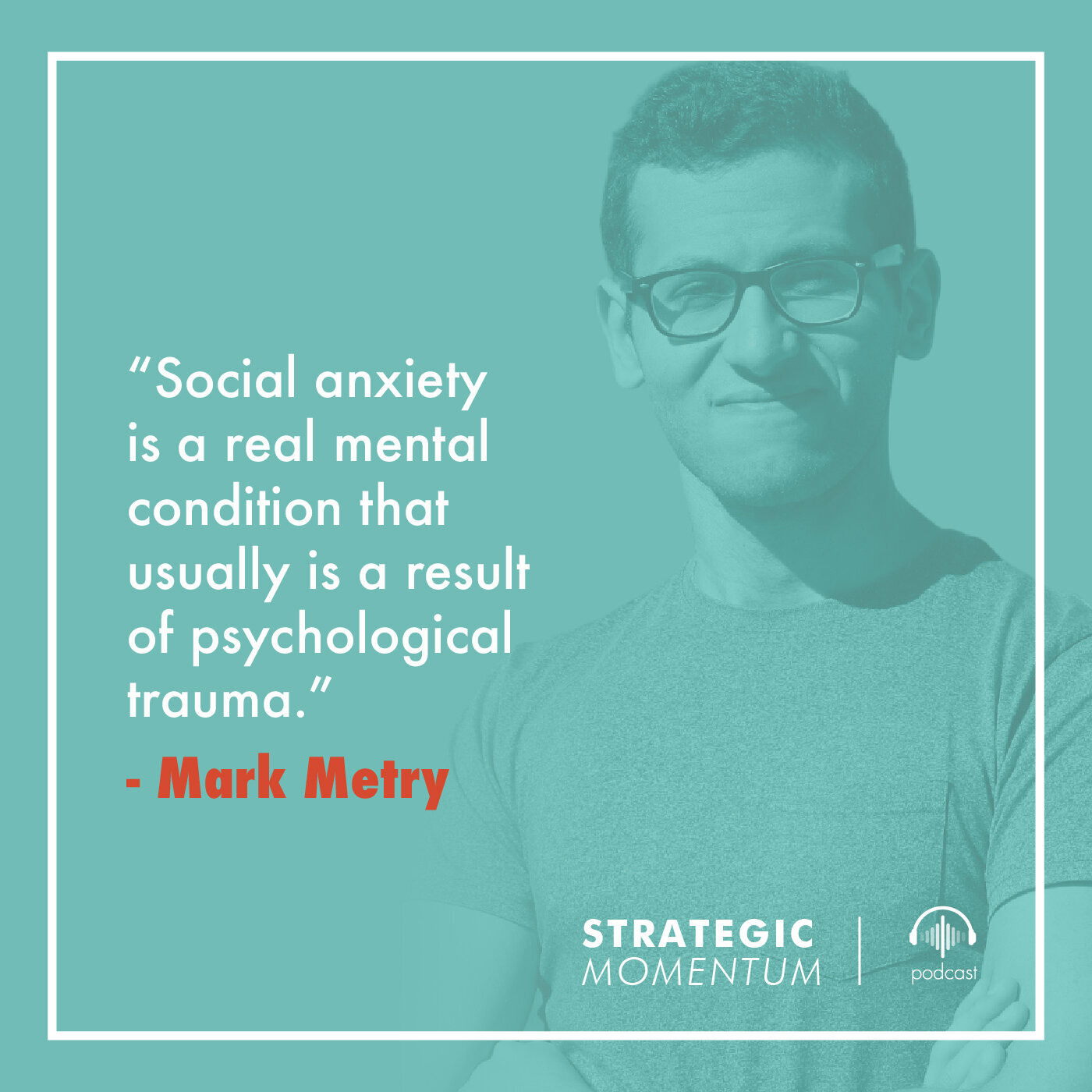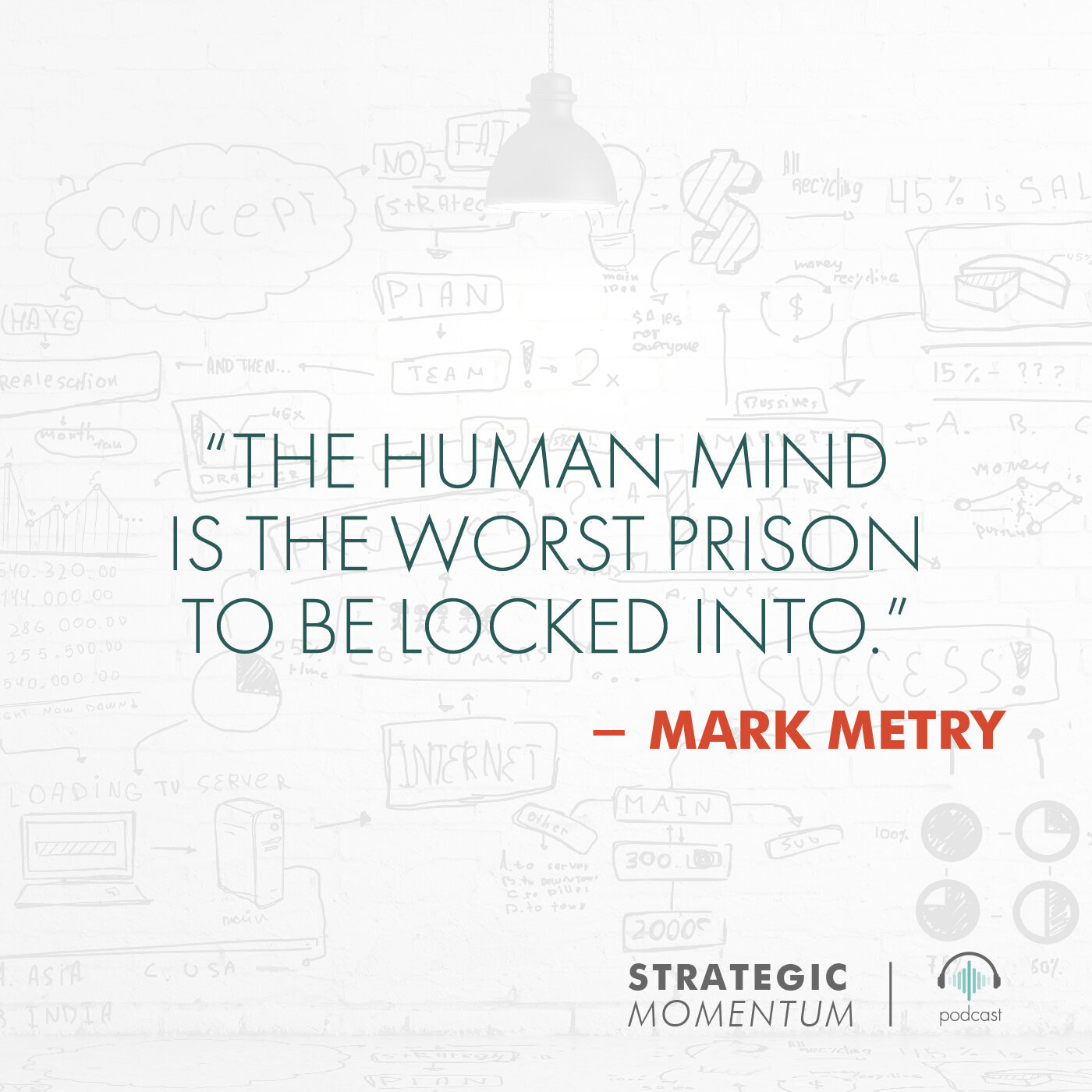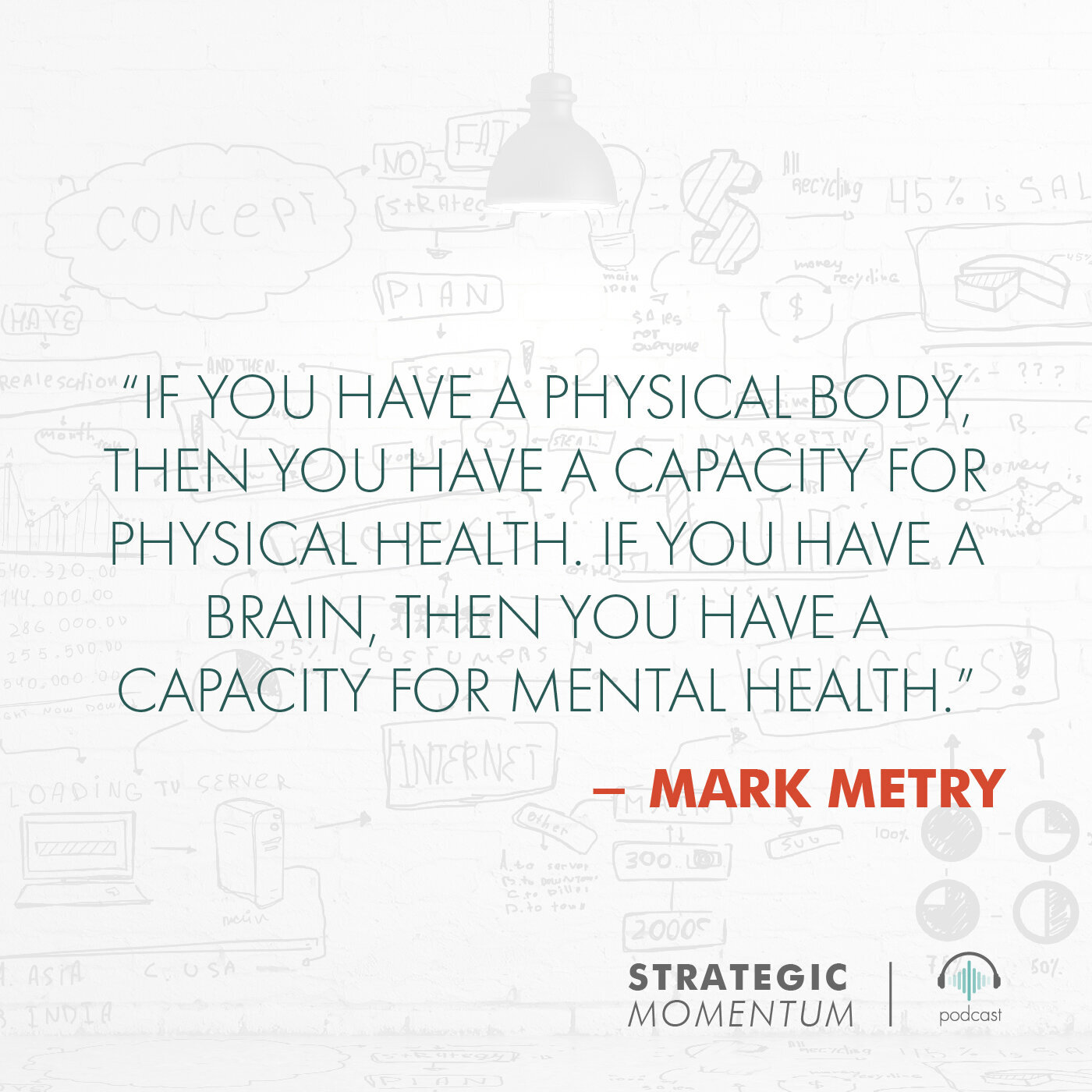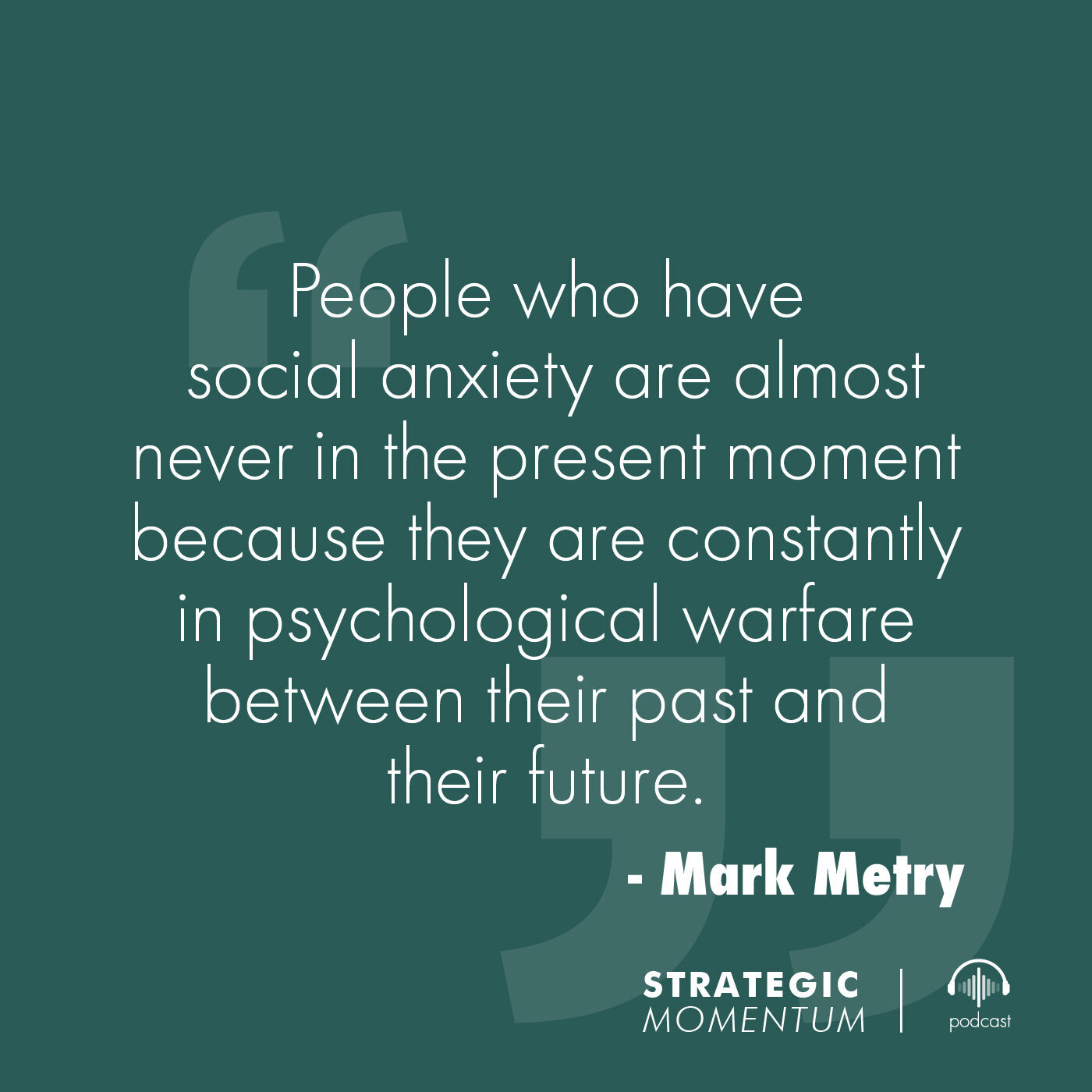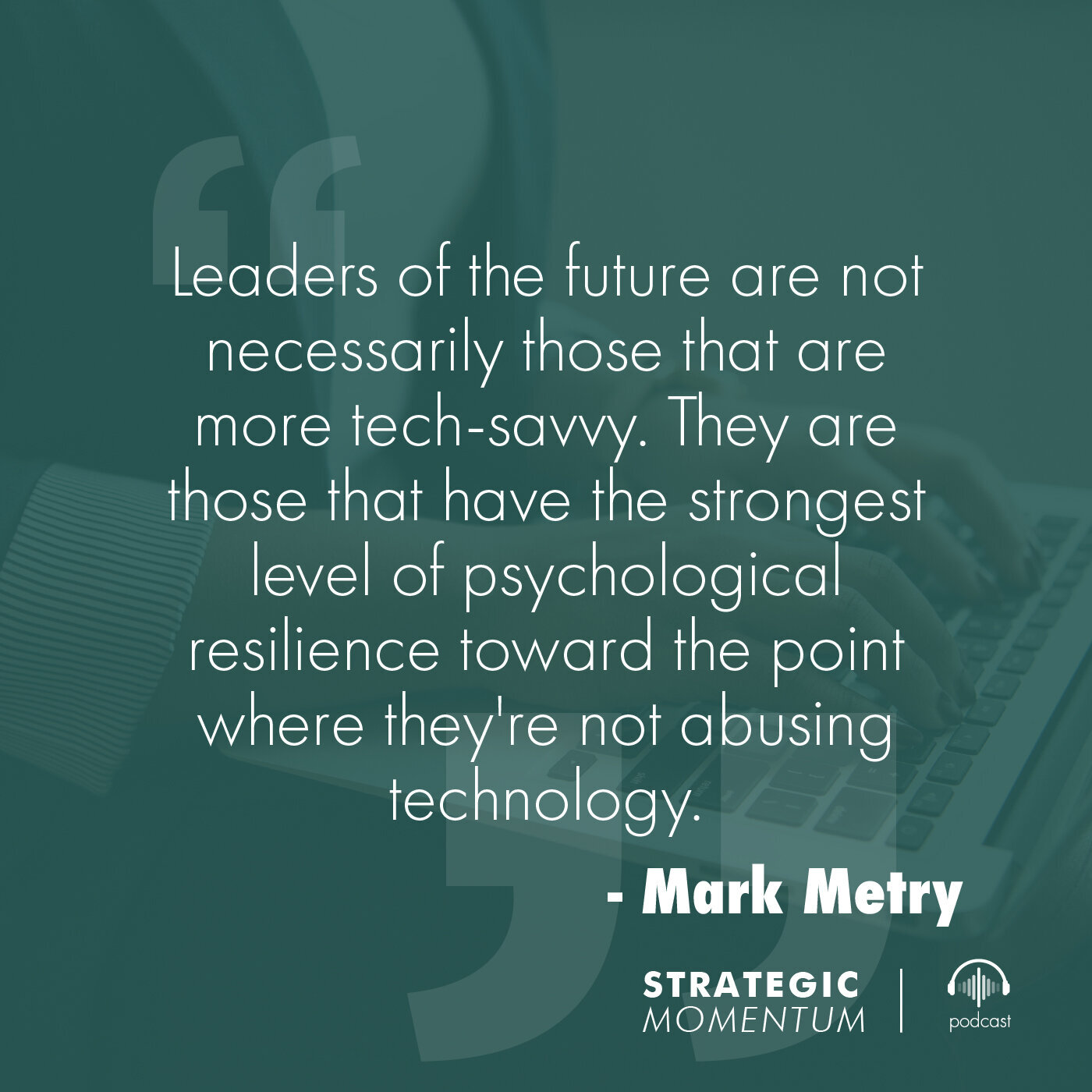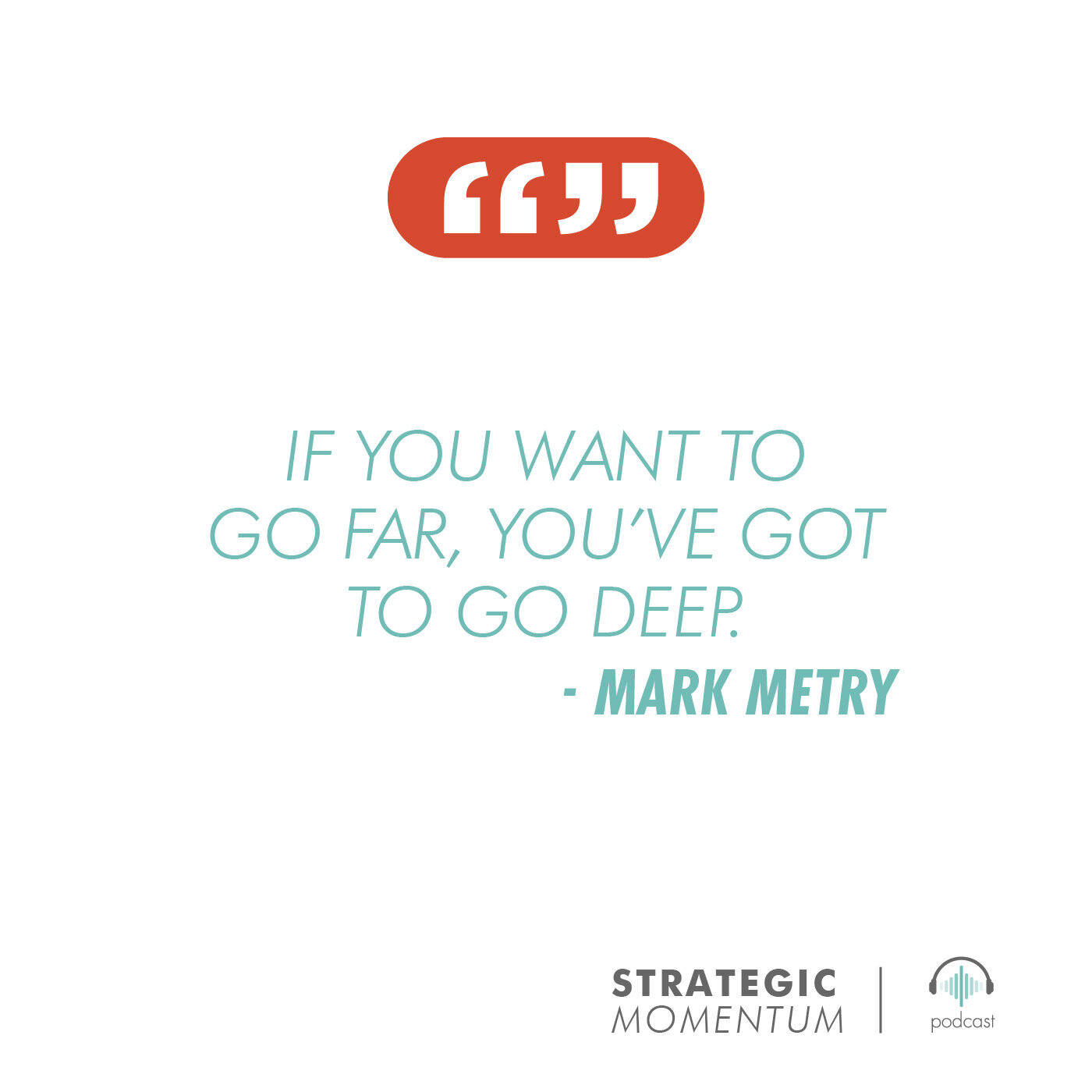Ep. 72 - Understanding and Overcoming Social Anxiety to Propel Your Career Forward - with Mark Metry
Find Us Wherever You Listen To Podcasts
Recently on the podcast, we’ve been digging deeper into those important soft skills than can drive business and career momentum. Whether you’re the leader of a company or a new hire, understanding and developing your EQ is one of those skills that’s essential to career success.
But, for some, breaking out of your comfort zone to build meaningful connections with others can be a bit more challenging. If you are one of many with social anxiety, the thought of networking or having difficult conversations with your boss or peers can trigger negative emotional responses. And if you manage someone with social anxiety, you might mistake their behavior for a lack of motivation, but really that’s not the case.
Mark Metry is a 22-year-old entrepreneur and author of the book Screw Being Shy: Learn How to Manage Social Anxiety and Be Yourself in Front of Anyone. He’s on a mission to spread awareness about social anxiety, to help people cope with its symptoms and overcome them.
On top of being an entrepreneur and author, Mark Metry is the host of the Global Top 100 Humans 2.0 podcast, an emcee, and a TEDx speaker on topics including human potential, mindset, social anxiety, mental health, and personal transformation.
For Mark, learning how to overcome his struggles while also reframing his mindset and approach were critical to launching and driving his career. But what did it take to get there? And what has he learned in the process?
In this episode, Mark shares his personal journey and what led to the creation of his book. He provides tips and advice for breaking through that anxiety, along with how to better understand those who may suffer from social disorders.
Identifying and Understanding Psychological Trauma
Mark’s journey began 22 years ago, when his parents immigrated to from Egypt to Boston where he was born and raised. They had to adjust to a new life where they were visibly outsiders, and Mark fell into shyness and introversion. And while he already felt like an outcast in school, his bullying became considerably worse after the 9/11 terrorist attacks and the subsequent rise of xenophobia.
“I remember being a kid and just facing a ton of pretty extreme racism, abuse, bullying. And also, at that same time, I began to develop physical health issues, like asthma, issues with my gut, appendix, insomnia, bladder. And yeah, I mean, that to me, when I look back at that now, that was sort of the onset.”
Mark realized later on that what he experienced was trauma. He defines it in his book: “Trauma is often the result of an overwhelming amount of stress that exceeds one’s ability to cope or integrate the emotions involved with that experience. It’s essentially when something you perceive based on your level of understanding of life so far goes wrong.”
His trauma from being bullied led to a growing discomfort with being around other people and constantly second-guessing himself. His internal voice told him people would reject him — and that led to society anxiety.
Oftentimes, people dealing with social anxiety seek escape or temporary relief, whether through substances or through physical distance. They retreat into their comfort zone and can lose the ability to live life in the present.
For Mark, he tried to cope with it by becoming an online entrepreneur. He started the World's #1 Minecraft server at age 15 and turned it into a six-figure business. Despite his financial success, he still wasn’t fulfilled as money didn’t provide happiness.
Mark went off to college but “by the time I was 18, I began to just try to escape the pain that I was in with alcohol, drugs, partying, definitely food was my vice of choice. And I remember this time where I had gained a ton of weight in a short period of time. And next thing I know, I'm like, I'm obese, I'm 220 pounds. My lifelong social anxiety transforms into social isolation.”
After falling into the deepest part of his depression, Mark realized there was nowhere to go but up. He researched social anxiety and experimented with coping mechanisms that would free him from his mental prison. “When I actually found out that, oh, wait, this social anxiety thing is like this thing in my brain that is working at like a neurochemical level, it sort of transformed more into like a science project.”
He forced himself to break out of that comfort zone, bit by bit. He started his latest business — an acceleration agency on the edge of the growing exponential technologies industry — and then his podcast, which eventually led him to write his book. Now, he’s championing “brain health” wherever he can.
The Science Behind Social Anxiety & Its Misconceptions
Approaching fear and anxiety from a scientific perspective can help you deal with its effects. Fear can be both a motivator and an inhibitor, which we talked about with Dr. Mary Lamia in episode 6, and again in episode 9.
For people with social anxiety, fear is an inhibitor. “People who have social anxiety have some sort of a dysfunction, whether it's their body is producing too much serotonin or too little serotonin or the modulators themselves are dysfunctional.”
In simplest terms, the mind perceives social situations as a threat based on that previous psychological trauma, and therefore the body goes into fight or flight — with flight being the preferred option to avoid further trauma.
Understanding this chemical process helps both people dealing with social anxiety and those who might know someone with this problem to work towards solutions because: “if you can't really talk to people and you can't really express who you are, then there's no way that you can speak out for yourself at a meeting with a boss or just sort of trying to figure out your career.”
Mental health is still commonly stigmatized and can be taboo in a work environment. A common misconception is that people who are quiet or withdrawn from social situations are unmotivated, or people may think that they have done something to upset that person. But the reality is that it has nothing to do with you — it’s their own trauma they are dealing with. So, as a business leader, it’s important to look for signs of anxiety issues and be open to having conversations with that person to ease any pressure.
Practicing Good Brain Health to Overcome Social Anxiety
To begin the journey to overcome social anxiety, it starts with taking small steps and repeating them until you feel comfortable taking on more. And those areas involve both mental and physical health.
It comes down to some core elements which are all interconnected: your diet, lifestyle, and overall well-being. They are highly correlated with your degree of social anxiety, and you have more control over your lifestyle and physical health than your mental health in any given moment.
The key, like in many other problem-solving situations, is to start small with a few repeatable actions, then gradually turn those into habits.
Mark also states in his book that you have to learn to be a critical thinker and implementer in your own life to create that successful momentum. It’s about developing this FLOW state of mind to help you get past your mind’s inner critic.
Anyone with a brain has a capacity for mental health issues. But it’s going to be one’s mental competitiveness that will outweigh digital competitiveness in the workforce, so understanding your own and others’ mental health is critical to driving your career forward.
Career Advice:
Pause every once in a while to re-evaluate things and gain perspective, which will help you go much further. “If you want to go far, you’ve got to go deep.”
Key Takeaways:
Social anxiety vs. shyness and introversion
Introverts focus more on their internal worlds than external. They prefer introspection and get energy from solitude and silence.
Shyness is a natural emotion that most people feel when they experience nerves and fear of meeting new people. But, for some, that initial feeling goes away after they begin to get comfortable with people.
Social anxiety happens when shyness and introversion escalate into a chronic fear of social situations. Many people have experienced this social discomfort at some point, like feeling awkward at a party or being nervous before a presentation, but people with social anxiety experience the effects to a debilitating extent.
Someone who is an introvert and can still speak their mind without much mental anguish, whereas a person with social anxiety retreats from speaking out of fear of being judged.
Psychological trauma is often the root cause of society anxiety. And trauma doesn’t happen exclusively as the result of devastating events like violence or being bullied; it can encompass events like being rejected by a friend, being mocked by others for saying or doing something different than everyone else. The manifestation of that fear and internal turmoil leads to behaviors that impact one’s ability to move forward in a healthy way.
Dealing with Social Anxiety
Understand that there is something deep in your past that is likely to have led to this, and that’s okay. It might not be your fault that you’ve developed this issue, but it’s your responsibility to take care of it. You can’t control external factors, but you can control how you respond to them.
Focus on health and diet, as this is all part of your overall well-being. Practice cleaner eating and regular exercise, even if it’s just making a few small changes to your routine at first, and then gradually build up.
Practice “Exposure Therapy:” set a goal to expose yourself to a few people a day by starting a conversation. Mark tried this with simply asking strangers for the time. When you are able to ask a question that is very specific with utility, not aimless, and not about yourself or anything deep, you will slowly begin to see this part of your brain open up. This gives your mind a chance to see what happens when you speak and rearrange those mental models in return.
In social situations like meeting and networking, overcoming the fear of social situations can start by putting others first.
Instead of focusing on your own fear and using band-aid solutions (e.g. getting a drink or vaping before the event), focus on who you can help—those who don't know where to go or what to do—and that can help you turn your self-critical thoughts on mute.
That means you really have to come into social situations with intent.
As a starting point, identify other introverts in the room (those standing or sitting by themselves) and ask interesting questions and genuinely try to understand who they are.
Think of it like a strategic plan: You set a goal for yourself before going into something, and once that’s defined, you figure out the strategies and tactics you're going to take to address that goal. When you can look at a situation in an objective way, it makes the thought of socializing a little less daunting.
Look to other peoples’ stories for inspiration: ”If you're listening to this and you do realize that you are in a situation where you don't know what to do or maybe you feel like things are really worse off for you, I would say to do research and to look at other people's stories. You know, look at other people's stories who have been in the same exact position that you are in right now, and what they did differently and what path they took. That's what I did.”
Working with People with Social Anxiety
As a business leader, if you have someone on your team who may be exhibiting signs of social anxiety, don’t dismiss them. Understand that they may have some underlying trauma that has stimulated the fight or flight response.
Use communication techniques to make situations more comfortable where possible and encourage positive mental health practices in the workplace.
Create environments for people to connect with purpose or simply do things for their mental well-being to build a positive culture.
Download the eBook
Get the key insights and advice from this episode in a PDF presentation.
Resources:
Visit markmetry.com
Buy Screw Being Shy
Relevant Podcast Episodes
For more tips on building wellness into the fabric of your company, check out Episode 56 with Michael Heinrich from Oh My Green.








